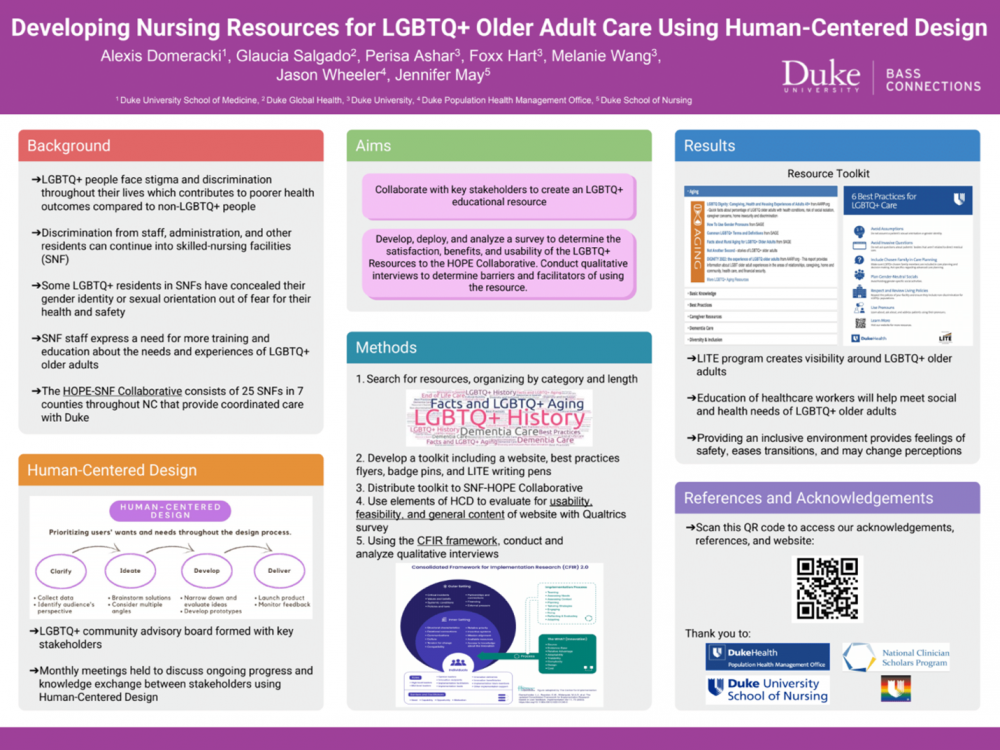LGBTQ+ Toolkit for Healthcare Workers
Project Team
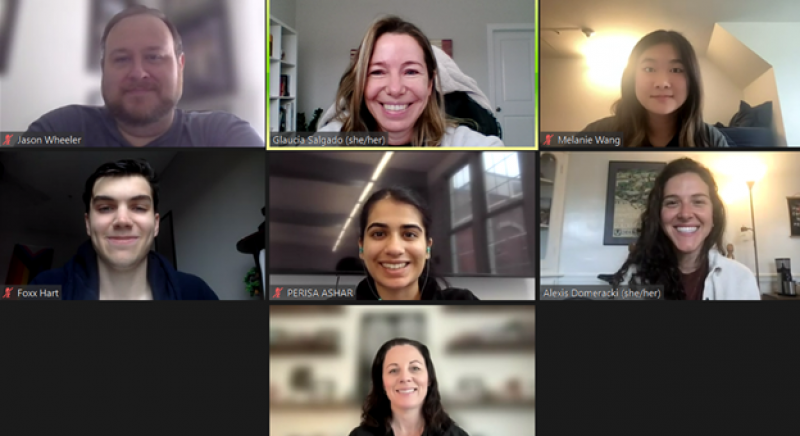
Team profile by Alexis Domeracki, Foxx Hart, Glaucia Salgado, Jason Wheeler, Jennifer May, Melanie Wang and Perisa Ashar
Approximately 6% of Americans aged 50 and older identify as lesbian, gay, bisexual or transgender (LGBTQ+), roughly 6.5 million people. This number is projected to increase to more than 20 million by the year 2060. As LGBTQ+ adults age, they will need options for long-term care (LTC) provided by skilled nursing facilities (SNFs) that can address their specific identity needs. Yet, healthcare workers employed in long-term care and SNFs have reported not feeling prepared to care for LGBTQ+ older adults and often request more training to meet the needs of this population. The consequences of lack of training among SNF health workers and staff may contribute to poorer health outcomes of LGBTQ+ older adults.
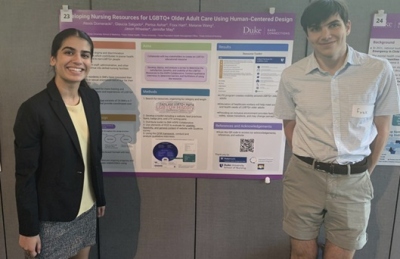 The Duke Population Health Management Office (PHMO), a care organization dedicated to improving health outcomes through results-driven care, evidence-based support and actional data analytics, leads the Health Optimization Program for Elders (HOPE) Skilled Nursing Facility Collaborative. The HOPE Collaborative is a group of approximately 25 SNFs across seven local counties in North Carolina that work closely with PHMO to improve care for older adults. Prior to the start of this project, there were no resources for the HOPE Collaborative that incorporated care guidance for LGBTQ+ patients. There was a need to develop these resources in collaboration with key community stakeholders to improve health care worker knowledge of SNF practices for the LGBTQ+ population.
The Duke Population Health Management Office (PHMO), a care organization dedicated to improving health outcomes through results-driven care, evidence-based support and actional data analytics, leads the Health Optimization Program for Elders (HOPE) Skilled Nursing Facility Collaborative. The HOPE Collaborative is a group of approximately 25 SNFs across seven local counties in North Carolina that work closely with PHMO to improve care for older adults. Prior to the start of this project, there were no resources for the HOPE Collaborative that incorporated care guidance for LGBTQ+ patients. There was a need to develop these resources in collaboration with key community stakeholders to improve health care worker knowledge of SNF practices for the LGBTQ+ population.
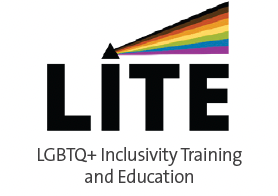 Our Bass Connections Team, guided by the LGBTQ+ Community Advisory Board, developed the LGBTQ+ Inclusivity Training & Education Initiative (LITE). This toolkit was developed to inform and train healthcare workers and staff involved in the care of LGBTQ+ older adults using SNFs. Using human-centered design and the guidance of our LGBTQ+ Community Advisory Board, our team developed a resources toolkit website containing a variety of topics related to LGBTQ+ older adults such as the history of LGBTQ+ movement, facts on aging, how to use pronouns, legal information, resources for caregivers and other topics. The LITE toolkit also includes Six Best Practices for LGBTQ+ Care, rainbow badge pins and a writing pen with our LITE logo.
Our Bass Connections Team, guided by the LGBTQ+ Community Advisory Board, developed the LGBTQ+ Inclusivity Training & Education Initiative (LITE). This toolkit was developed to inform and train healthcare workers and staff involved in the care of LGBTQ+ older adults using SNFs. Using human-centered design and the guidance of our LGBTQ+ Community Advisory Board, our team developed a resources toolkit website containing a variety of topics related to LGBTQ+ older adults such as the history of LGBTQ+ movement, facts on aging, how to use pronouns, legal information, resources for caregivers and other topics. The LITE toolkit also includes Six Best Practices for LGBTQ+ Care, rainbow badge pins and a writing pen with our LITE logo.
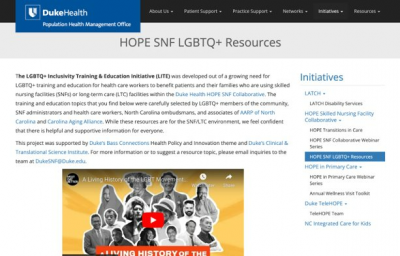
The training and education topics that you find in our website were carefully selected by LGBTQ+ members of the community, SNF administrators and healthcare workers, the North Carolina Ombudsman Program, and associates of AARP of North Carolina and Carolina Aging Alliance. While these resources are for the SNF/LTC environment, we feel confident that they contain helpful and supportive information for everyone.
The 2022-2023 academic year has had notable accomplishments including disseminating our research at several conferences, including the Gerontological Society of America Conference, the Southern Gerontological Society of America Conference and the Margolis Seminar Series. Additionally, team leads were invited to present this project at the American Case Management Association 2023 North Carolina Chapter Conference in September 2023. This project has brought together LGBTQ+ community members and allies, SNF administrators, and other organizations along with the Bass Connections research team to conduct community-engaged work centered around health equity and implementation science to improve the care of LGBTQ+ older adults in SNFs.
Bass Connections team member and Duke medical student shared her personal experience on the team:
Being a member of the LITE Bass Connections team has been one of the more rewarding experiences in my medical school tenure. The interdisciplinary nature of Bass Connections facilitates robust, well-rounded discussion leading to innovative solutions from a variety of perspectives. In being given the opportunity to take the lead on meetings and other aspects of the project, I developed invaluable leadership skills which I will take into my future training as a physician. Most importantly, this community-based project reflected my values of increasing access to equitable care for the LGBTQ+ community. This generation of LGBTQ+ pioneers fought stigma and discrimination so that future generations of LGBTQ+ individuals would one day achieve equal rights. Participating in the LITE team allowed me to give something back to the heroes who came before me. –Alexis Domeracki
Developing Nursing Resources for LGBTQ+ Older Adult Care Using Human-Centered Design
Poster by Alexis Domeracki, Glaucia Salgado, Perisa Ashar, Foxx Hart, Melanie Wang, Jason Wheeler and Jennifer May

